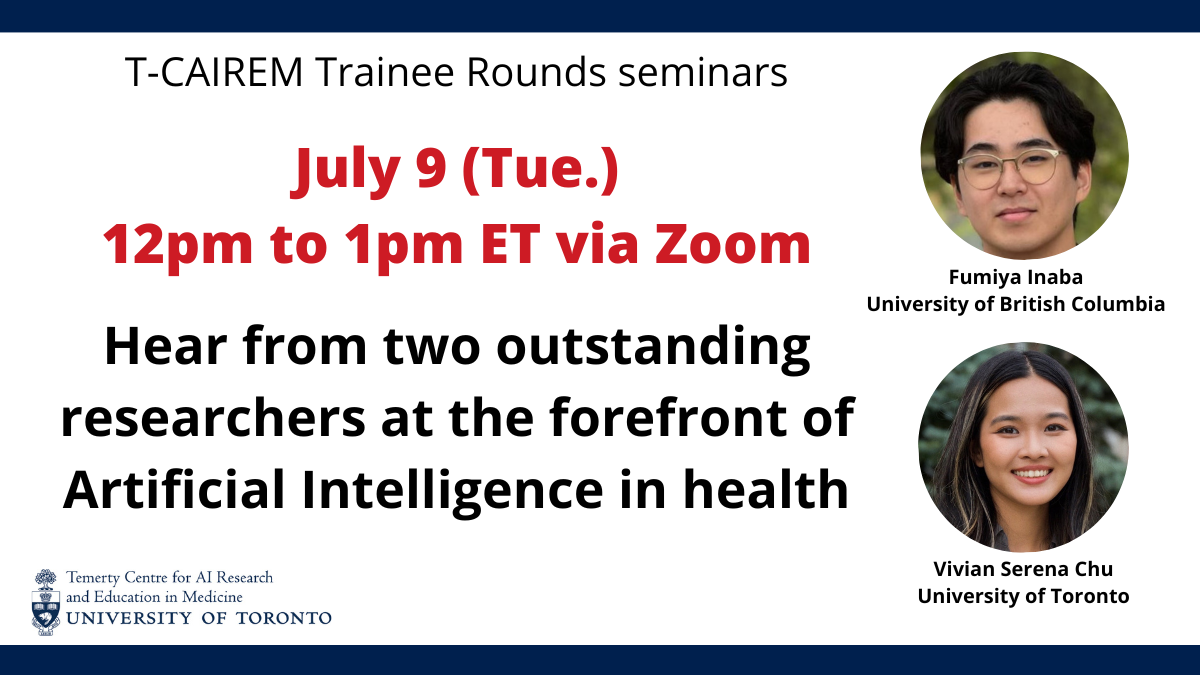Main Second Level Navigation
Trainee Rounds: Fumiya Inaba and Vivian Serena Chu
DATE: July 9 (Tue.)
TIME: 12pm to 1pm
METHOD: Zoom
PRESENTERS: Fumiya Inaba and Vivian Serena Chu
Fumiya Inaba
MSc Student, Interdisciplinary Oncology, University of British Columbia
TITLE: Large-scale DNA Organization Identifies Aggressive Prostate Cancer in Low and Intermediate-Risk Patients
ABSTRACT: Prostate cancer is the most prevalent cancer among Canadian and American men. Treatment can be challenging, as prostate cancer can be an indolent or lethal disease. Consequently, treatment paradigms rely on patient risk prediction and prognoses. The D’Amico risk classification is currently the most widely adopted method for prognostication. However, emerging evidence suggests the inadequacy of this method alone, suggesting the necessity of more precise risk assessment methods. Here, we leverage deep learning image processing methods to analyze large-scale DNA organization of nuclei in prostate core needle biopsies for more accurate prediction of patient progression or recurrence risk.
ABOUT: I am an MSc student in the Interdisciplinary Oncology Program at the BC Cancer Research Centre, under the guidance of Dr. Martial Guillaud and Dr. Calum MacAulay. My current research aims to advance the understanding of cancer progression and its underlying biology through computational methods. Leveraging image processing algorithms, such as instance-segmentation of nuclei in whole slide images, enables a detailed analysis not only at the level of individual cells but also of their interactions and architectural distribution in tissue sections. My ultimate goal is to contribute novel insights into cancer biology and develop tools which inform clinical decision-making.
Vivian Serena Chu
Department of Medical Biophysics, Faculty of Medicine, University of Toronto
TITLE: Mapping the neoantigen landscape of patient-derived organoids using a peptide-based large language model
ABSTRACT: Cancer immunotherapy leverages the immune system to target cancer cells. An emerging approach is neoantigens—unique tumor-specific proteins. The traditional search for neoantigens has centered around patient-specific mutations, and a significant challenge has been in validation due to the lack of models which faithfully recapitulate characteristics of original tumors. Utilizing patient-derived organoids from the Princess Margaret Living Biobank and deep learning, the immunogenic neoantigen landscape is predicted and profiled. As the field of cancer immunotherapy continues to evolve, we hope to accelerate the translation of immunotherapies which are more effective and less harmful into clinical practice, improving quality of life for patients.
ABOUT: Vivian is a 2nd-year PhD Student in the labs of Dr. Bo Wang and Dr. Hansen He in the Department of Medical Biophysics at the University of Toronto. Vivian obtained her BSc at the University of Waterloo in Molecular Genetics and Bioinformatics. Vivian’s doctoral research uses deep learning to predict and enhance the design of RNA-based therapies, such as RNA interference molecules and neoantigens, to guide personalized cancer treatment strategies. Vivian hopes to bridge the gap between complex omic data sets, which include genomics, transcriptomics, proteomics, etc. to elucidate a more comprehensive picture of biological systems for potential therapeutic interventions.

